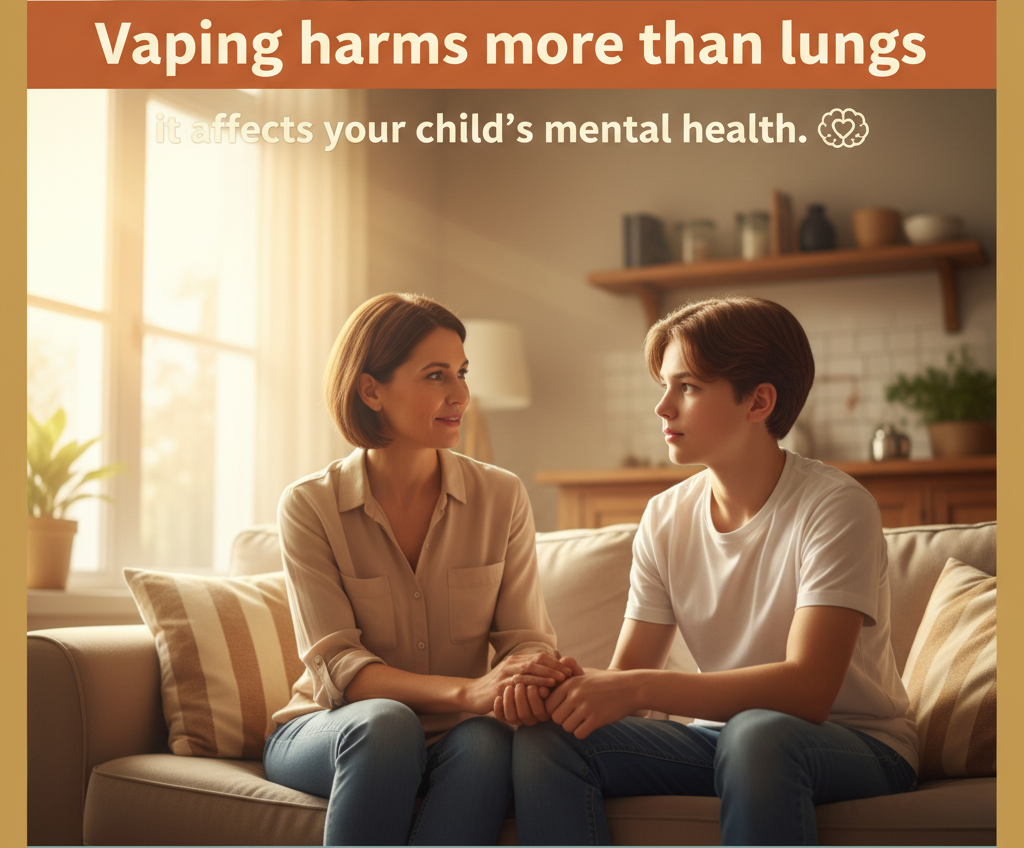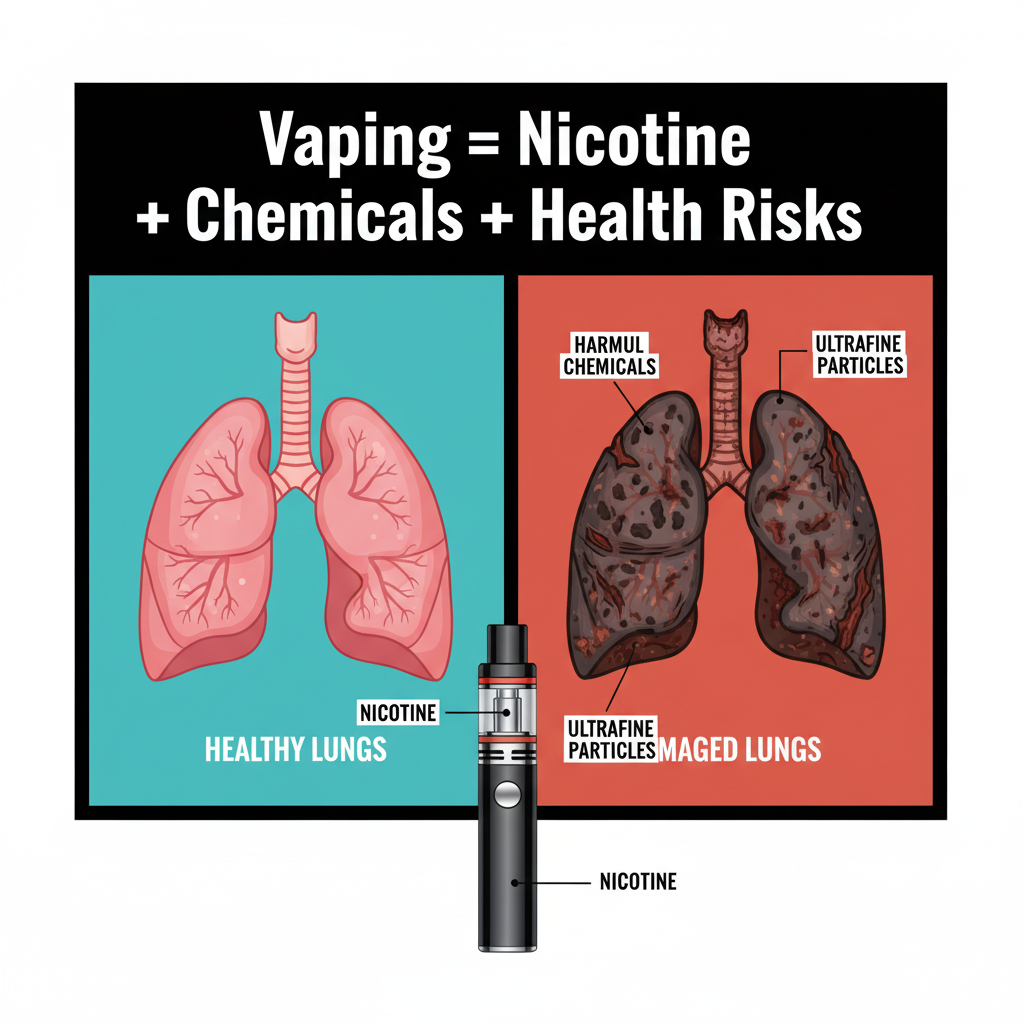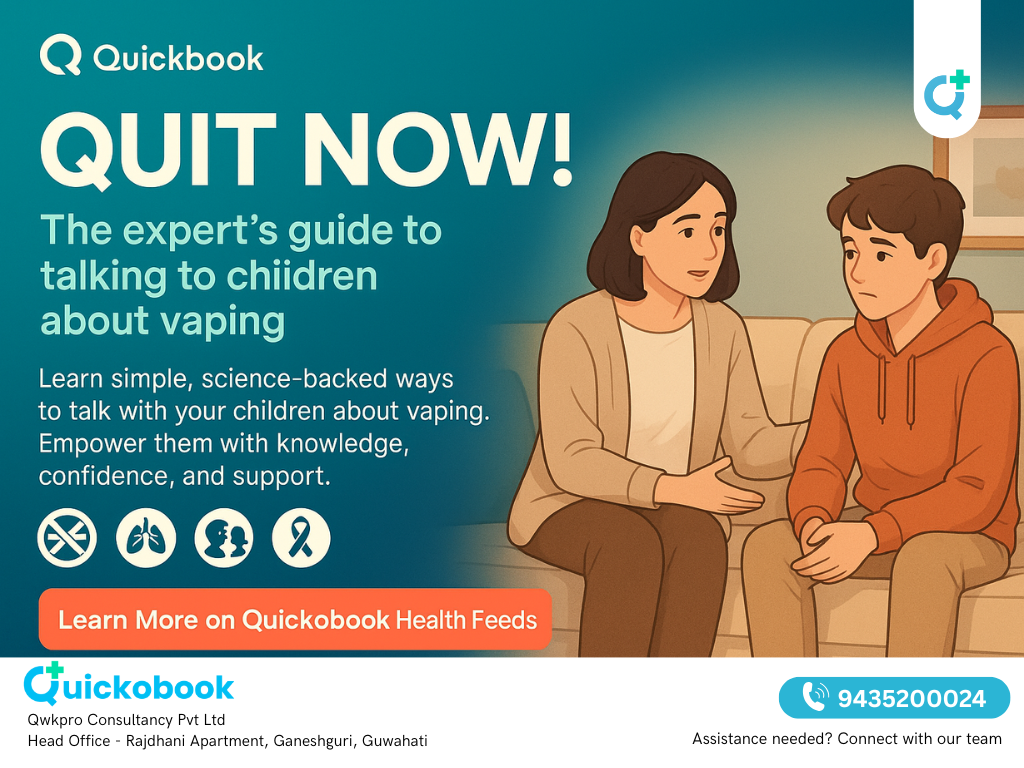Introduction: Why This Conversation Matters
Vaping has become one of the fastest-growing habits among Indian teenagers. Sleek, fruity-flavoured e-cigarettes are easy to hide and often marketed as “safe alternatives” to smoking. But the truth is, vaping can harm both physical and mental health
, especially in children and teens.
As a parent or guardian, you might feel unsure how to start this talk. This guide gives you a step-by-step approach to discussing vaping openly, calmly, and effectively — protecting your child’s wellbeing and helping them make smarter health choices.

Understanding Vaping and Its Impact
What Is Vaping?
Vaping refers to inhaling vapour produced by an e-cigarette or similar device. Most vapes contain nicotine, a highly addictive substance that affects the brain’s development, particularly in teenagers.
The Mental Health Connection
Nicotine changes how the brain handles stress and reward. Teens who vape are more likely to:
- Experience anxiety or mood swings
- Develop attention problems
- Struggle with low motivation and irritability
- Depend on vaping to cope with emotions
Vaping Myths Parents Should Know
- “Vaping is safer than smoking.” → It still harms the lungs and brain.
- “Vapes don’t contain nicotine.” → Most do, even those labelled as ‘nicotine-free’.
- “It helps manage stress.” → It often worsens anxiety over time.

Why Teens Start Vaping
Understanding why helps you address the root cause. Common reasons include:
- Peer pressure — wanting to fit in with friends.
- Curiosity — seeing influencers or celebrities use vapes.
- Misinformation — thinking it’s harmless.
- Stress relief — poor coping skills for academic or social pressure.
These are all areas where health education and honest communication can make a big difference.

Expert-Backed Ways to Talk to Your Child About Vaping
1. Choose the Right Time and Tone
Don’t make it a lecture — make it a conversation. Pick a relaxed setting, like during a drive or walk, and speak calmly without blame or fear.
READ ALSO: Can You Get The Hpv Vaccine As An Adult?
2. Ask, Don’t Assume
Start with open-ended questions like:
- “Have you ever heard about vaping from your friends?”
- “What do you think about people who vape?”
This helps you understand what they already know.
3. Share Real Facts
Use health education resources like government websites (MoHFW, WHO India) to show how vaping affects lungs, heart, and brain development. Explain how nicotine impacts mood and focus.
4. Connect It to Their Goals
Link vaping’s harms to what matters most to them — sports, studies, skin health, or self-confidence. Teens are more responsive when advice connects to their lives.
5. Model Healthy Behaviour
Avoid smoking or vaping yourself. If you’re trying to quit, be open about your journey. It shows strength, not weakness.
6. Involve Schools and Counsellors
Teachers and school counsellors can reinforce your message through structured programs and mental health education sessions.
Recognizing Signs of Vaping
Be alert but not intrusive. Common signs include:
- Sweet or fruity smell on clothes
- Frequent coughing or dry mouth
- Sudden changes in mood or concentration
- Secretive behaviour or hiding small USB-like devices
If you suspect vaping, talk gently. Shaming will push them away — empathy builds trust.
Helping Your Teen Quit Vaping
- Set realistic goals: Quitting may take time.
- Replace the habit: Encourage sports, hobbies, or mindfulness activities.
- Address mental health: Seek help if they show signs of anxiety or depression.
- Consult a doctor: A general physician or psychologist can create a personalized quit plan.
- Use Quickobook: Find nearby mental health experts or counsellors easily on Quickobook for both online and in-person sessions.
Role of Parents in Promoting Mental Health and Awareness
Your guidance can protect your child’s mind and body. Encourage:
- Open talk about emotions and stress
- Balanced digital habits
- Mindfulness and yoga for relaxation
- Awareness of peer influence and online trends
When children feel heard, they’re less likely to experiment with substances like vapes or cigarettes.
Prevention Through Health Education
Schools and parents can work together to:
- Conduct vape awareness campaigns
- Integrate mental health education into curriculums
- Offer confidential counselling services
- Encourage healthy extracurricular engagement
Education is prevention. When teens know the truth, they make safer choices.
When to Seek Professional Help
Seek help if your child:
- Admits to regular vaping
- Shows withdrawal signs (irritability, anxiety, poor focus)
- Struggles with self-esteem or mood changes
Quickobook connects you to qualified psychologists, psychiatrists, and counsellors across India for early and confidential intervention.
Risks and Complications of Teen Vaping
- Addiction and brain changes
- Sleep problems and fatigue
- Impaired learning and memory
- Increased risk of smoking later
- Depression or anxiety disorders
- Long-term heart and lung disease
Lifestyle and Family Tips
- Have weekly “no-judgement” family talks
- Encourage physical activity and creativity
- Limit screen time before bed
- Promote healthy snacks and water intake
- Celebrate small wins when they make positive choices
Conclusion
Vaping may seem like a trend, but its effects on mental health and development can last a lifetime. Talking early, staying informed, and using supportive language can help your child stay strong against peer pressure.
As a parent, you’re not alone — you’re your child’s best defence. With awareness, empathy, and tools like Quickobook, you can build a smoke-free, vape-free future together.
50 FAQs
Q1. What is vaping?
A. Vaping means inhaling vapour from an e-cigarette containing nicotine or other chemicals.
Q2. Why do teenagers vape?
A. Mostly due to peer pressure, curiosity, or stress relief.
Q3. Is vaping safer than smoking?
A. No. It still damages the lungs, heart, and brain.
Q4. Does vaping cause mental health problems?
A. Yes. It increases anxiety, mood swings, and attention issues.
Q5. How can I talk to my child about vaping?
A. Stay calm, ask questions, and share real facts instead of judging.
Q6. Can vaping affect school performance?
A. Yes. It can reduce focus, memory, and motivation.
Q7. What are signs my teen is vaping?
A. Sweet smells, coughing, mood changes, and secretive behaviour.
Q8. Is nicotine addictive?
A. Extremely. It alters brain chemistry and causes dependence.
Q9. How does vaping affect the brain?
A. It interferes with brain growth and emotional regulation.
Q10. Are “nicotine-free” vapes safe?
A. No. Many contain harmful chemicals and hidden nicotine.
Q11. Can vaping cause depression?
A. It can worsen mood and increase risk of depression.
Q12. Can schools stop students from vaping?
A. Through strict rules and awareness sessions.
Q13. Does vaping help with stress?
A. No. It may temporarily distract but worsens stress long-term.
Q14. What can parents do if they find a vape?
A. Talk gently and seek professional guidance.
Q15. How young are kids starting to vape?
A. Some start as early as 12–14 years old.
Q16. What’s in vape juice?
A. Nicotine, flavouring, and chemicals that harm the lungs.
Q17. Can vaping affect physical fitness?
A. Yes. It reduces lung capacity and stamina.
Q18. How to help a teen quit vaping?
A. Offer support, counselling, and medical advice.
Q19. Can therapy help?
A. Yes. Behavioural therapy improves coping skills.
Q20. Is vaping legal for minors in India?
A. No. Sale of e-cigarettes is banned in India.
Q21. Can vaping trigger anxiety attacks?
A. Yes. Nicotine can worsen anxiety symptoms.
Q22. Do e-cigarettes contain tar?
A. No, but they contain other toxic chemicals.
Q23. Can quitting cause withdrawal?
A. Yes. Symptoms include irritability, headaches, and cravings.
Q24. How long does nicotine stay in the body?
A. Around 1–3 days, but brain effects last longer.
Q25. Can a doctor help with withdrawal?
A. Yes. A GP or psychiatrist can suggest safe methods.
Q26. What’s the best way to prevent vaping?
A. Early, honest conversations and education.
Q27. Can friends influence vaping habits?
A. Absolutely. Peer pressure is a major factor.
Q28. Do vapes smell like cigarettes?
A. No. They often smell fruity or sweet.
Q29. Can vaping damage teeth?
A. Yes. It causes gum problems and dry mouth.
Q30. Can vape exposure harm non-users?
A. Yes, through secondhand aerosol.
Q31. How can schools support parents?
A. By conducting workshops and awareness drives.
Q32. Can vaping affect sleep?
A. Yes. Nicotine disrupts sleep cycles.
Q33. Are herbal vapes safe?
A. Not necessarily. They may still harm lungs.
Q34. Can vaping lead to smoking?
A. Studies show many vapers later start smoking.
Q35. How do I keep my child safe online from vape ads?
A. Use parental controls and discuss online influence.
Q36. Can nicotine harm a developing brain?
A. Yes, especially before age 25.
Q37. What’s the cost of vaping in India?
A. Devices can range ₹1,000–₹5,000; addiction costs more in health.
Q38. How to make my teen open up?
A. Build trust, listen more, and avoid scolding.
Q39. What’s Quickobook’s role in this issue?
A. It helps families find doctors, counsellors, and therapists online.
Q40. Can family counselling help?
A. Yes. It strengthens communication and understanding.
Q41. How can schools include health education?
A. Add vaping awareness to health and science lessons.
Q42. Can nutrition help brain recovery after quitting?
A. Yes. Omega-3s, fruits, and water support brain health.
Q43. Is vaping addictive after one use?
A. It can be — even short exposure triggers cravings.
Q44. How long does it take to quit?
A. It varies; with support, most succeed within months.
Q45. Can parents join support groups?
A. Yes. Many online forums and hospitals offer them.
Q46. How does vaping harm mental health?
A. It changes mood chemicals, leading to stress and irritability.
Q47. Are boys or girls more at risk?
A. Both equally, though boys report higher use rates.
Q48. Can exercise help in quitting vaping?
A. Yes. It reduces cravings and improves mood.
Q49. What if my child denies vaping?
A. Stay calm; focus on trust, not punishment.
Q50. Is quitting worth it?
A. Absolutely. Within weeks, breathing, mood, and focus improve.
Quickobook CTA
Need professional help to quit vaping or support your child’s mental health?
???? Book an appointment with verified counsellors, psychologists, and general physicians on Quickobook.com — India’s trusted healthcare platform.
Disclaimer
This article is for educational purposes only and does not replace professional medical or psychological advice. Always consult a qualified healthcare provider before making any treatment or lifestyle decisions.









Comments (0)
No comments yet. Be the first to share your thoughts!
Leave a Comment